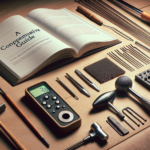The handpan is a magical, ethereal-sounding instrument that has captured the imagination of musicians and enthusiasts around the world. Its unique sound and beautiful appearance make it a treasure to own and play. However, like any valuable item, it requires proper care and maintenance to ensure it remains in excellent condition for years to come. Maintaining the handpan’s surface is crucial, as it preserves both its aesthetic and acoustic qualities. Here are some essential tips for maintaining your handpan’s surface.
1. Regular Cleaning
Regular cleaning is critical to maintain the surface of your handpan. Dirt, oils from your hands, and other contaminants can accumulate on the surface, potentially causing corrosion and affecting the sound quality over time. It’s recommended to clean your handpan after every session.
Use a soft, lint-free cloth and a mild soapy solution to gently wipe down the surface. Ensure that you wipe it dry immediately to prevent any water spots or moisture buildup. Avoid abrasive or harsh chemicals, as these can damage the delicate surface.
2. Use a Protective Oil
Your handpan’s surface benefits significantly from the application of a protective oil. This layer of oil serves as a barrier against rust and other forms of corrosion. There are various oils designed specifically for this purpose, such as Phoenix Oil or Froglube.
To apply the oil, pour a small amount onto a soft cloth and rub it gently onto the handpan’s surface, ensuring an even coat. Let it sit for a few minutes, then wipe off the excess. This should be done every month, or more often if you live in a humid environment.
3. Handle With Care
The handpan is a delicate instrument, and mishandling can lead to surface damage and dents that might alter its sound. Always hold your handpan with clean hands to minimize the transfer of oils and dirt. Use both hands to support it evenly, and avoid dropping or knocking it against hard surfaces.
When not in use, store your handpan in a sturdy, padded case. Make sure the case is designed to fit the handpan snugly, providing adequate protection while preventing any movement inside the case. Avoid placing heavy items on top of the case as this might cause pressure that could warp the instrument.
4. Avoid Extreme Temperatures and Humidity
Exposure to extreme temperatures and humidity can adversely affect your handpan. Both hot and cold extremes can cause expansion and contraction of the metal, leading to potential warping and detuning. High humidity can accelerate the corrosion process.
It’s best to store your handpan in a climate-controlled environment, keeping it away from direct sunlight, heaters, or air conditioning vents. If you need to travel with your handpan, use thermal protection covers to shield it from sudden temperature changes.
5. Regular Inspection
Regularly inspecting your handpan helps in early detection of any signs of damage or wear. Look for any changes in color, which might indicate rust or oxidation. Check for scratches, dents, or any unusual sounds while playing.
If you notice any issues, it’s best to consult a professional handpan maker or repair service. They can provide expert advice and necessary repairs to ensure your instrument remains in optimal condition.
6. Avoid Harsh Playing Techniques
Playing technique is also fundamental in preserving the surface of your handpan. Using excessive force or playing with hard objects can cause dents or scratches. Play gently with your hands, using the pads of your fingers rather than your nails.
Remember that the beauty of the handpan lies in its subtle, soothing sounds, achievable with light taps and gentle touches. Practicing a softer playing technique will not only protect your handpan but also enhance your musical expression.
Conclusion
Maintaining your handpan’s surface is a blend of regular care, proper handling, and attentiveness to its environment. By adopting these essential tips, you will ensure that your handpan remains in pristine condition, both in look and sound. Regular cleaning, the application of protective oil, careful handling, avoiding extreme conditions, regular inspections, and gentle playing techniques are key practices for preserving the life and quality of this enchanting instrument. A well-maintained handpan will continue to produce its magical sounds, inspiring you and others for years to come.
FAQs
1. What is the best oil to use on a handpan?
The best oils to use on a handpan are those specifically designed for metal protection, such as Phoenix Oil or Froglube. These oils provide a protective barrier against rust and corrosion. It’s essential to use a non-abrasive and safe product for your instrument.
2. Can I use any cloth to clean my handpan?
It’s recommended to use a soft, lint-free cloth for cleaning your handpan. Avoid abrasive materials as they can scratch and damage the surface. Microfiber cloths are an excellent choice for gently wiping down your handpan.
3. How often should I apply protective oil to my handpan?
You should apply protective oil to your handpan at least once a month. If you live in a humid environment or play your handpan frequently, consider applying it more often to provide continuous protection against corrosion and rust.
4. What should I do if I find rust on my handpan?
If you find rust on your handpan, it’s essential to treat it promptly to prevent further damage. Gently clean the affected area with a soft cloth and a little oil. If the rust is extensive, it may require professional service to restore the instrument’s surface correctly.
5. Is it safe to travel with my handpan?
Yes, it is safe to travel with your handpan if you use a sturdy, padded case designed specifically for the instrument. Ensure the case provides adequate protection against impacts, and consider using thermal protection covers to shield it from temperature changes. Always handle with care while transporting.





